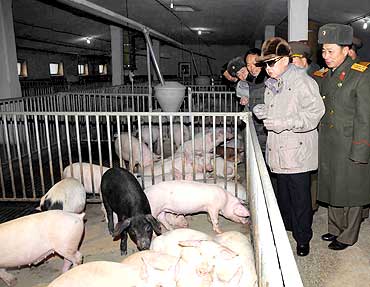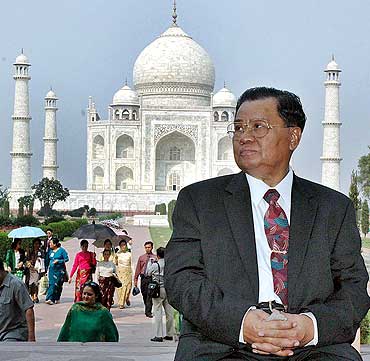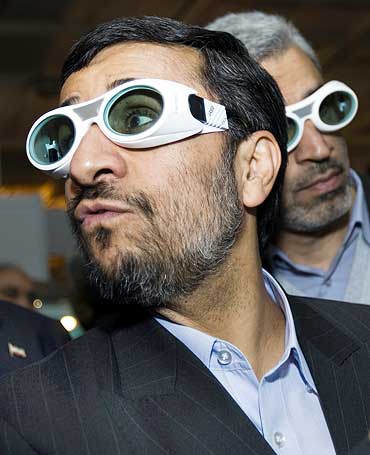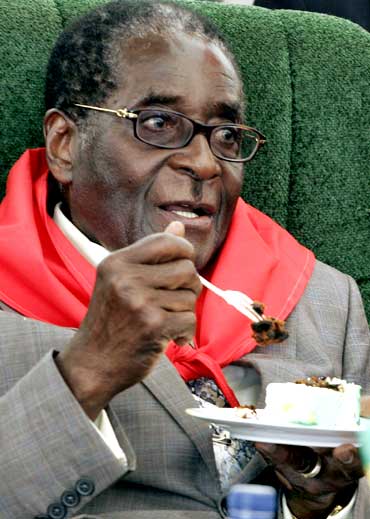 | « Back to article | Print this article |
Kim Jong-il: A leader with a weakness for cognac
As many as 109 crore people across the world continue to languish under various forms of dictatorship, according to a recent article in the Foreign Policy journal.
The article estimates that nearly 40 nations around the world, most of them in Africa and Asia, are ruled by these ruthless dictators. Most of these countries are desperately poor, where the ruling elite and their cronies milk the economy dry, leaving millions of citizens to live and die in squalour.
Let's take a look at some of the most notorious despots and dictators who make the world a much, much more dangerous place to live in.
Kim Jong-il of North Korea
He is heard about, revered and feared in equal measure, but the ruler of the world's most secretive regime is rarely seen in public. Foreign media often speculates that the heavily diabetic dictator has died or is terminally ill; reports strongly refuted by the state-owned media.
Foreign Policy calls him a "personality-cult-cultivating isolationist with a taste for fine French cognac". In Kim Jong Il's merciless regime, lakhs of dissenters have been thrown into prisons and labour camps located in the countryside, and they are held under brutal conditions.
Citizens can avail of basic amenities and facilities based only on their level of allegiance to the ruling party. Opponents of the ruling Korean Workers' Party and likely defectors are not only locked up for life, their relatives and children are also made to serve life imprisonments.
The man in charge of the world's fourth largest army reportedly has a penchant for alcohol, attractive women and luxurious villas. Meanwhile, millions of North Koreans live in abject poverty, thanks to his unrealistic visions of a 'self-dependant' economy.
Hu Jintao: The smiling despot
Hu Jintao of China
As one of the prominent leaders of the Communist Party of China posted in Tibet, Hu Jintao faced severe protests and opposition from Tibetans in 1989. Jintao tackled the situation by calling in the army to control the protestors. Hundreds of Tibetans were reportedly killed in the subsequent clashes. Jintao's success in quelling the protests reportedly gave the central leadership in Beijing the confidence to go ahead with the Tiananmen Square massacre.
In spite of his low-profile image and reserved manner, Jintao is considered the second most powerful person in the world after United States President Barack Obama. His opponents claims that the soft-spoken Chinese President also played a crucial rule in the unnatural death of Tibetan spiritual leader Panchen Lama.
Foreign Policy calls him "A chameleon despot who beguiles foreign investors with a smile and a bow, but ferociously crushes political dissent with brutal abandon."
China's already questionable human rights record has worsened under Jintao's 7-year rule. His administration has drawn international condemnation over the ruthless suppression of the Tibet protests and the imprisonment of hundreds of monks, the callous relief efforts after the Yushu earthquake and the crackdown to control the Xinjiang riots
The Communist nation has also intensified its campaign against intellectuals, writers, artists and lawyers who have raised their voice against the government.
Jintao has reinstated many of the media restrictions withdrawn by his predecessors. He has put in place a press certification system which is going to give Chinese journalists training in Marxist news theories. The government has also blocked access to selected sites operated by major foreign news outlets, health organisations, foreign governments and educational institutions.
Than Shwe: The military 'coconut head'
Than Shwe of Myanmar
This postman-turned-soldier-turned-general is a regular feature in any 'worst dictators list'. The cruel and reclusive ruler has been the head of the junta, one of the worst military regimes in the world, for nearly 20 years.
Than Shwe has crushed all attempts by the Opposition to introduce democracy and imprisoned Nobel Peace Prize winner and popular leader Aung San Suu Kyi for the last 20 years. He has clung on to power in spite of crossing the mandatory retirement age of 60 years, while his wife and other family members have amassed vast fortunes.
A video of the wedding of his daughter, replete with diamonds, gold and champaign, sparked outrage in the international community.
Than Shwe has spearheaded a bloody campaign against the Karen community, routinely detaining and torturing members of the ethnic minority group. His government has shut down each and every independent media house and only allows state-sponsored publications.
In the wake of the devastating Cyclone Nargis in 2008, Than Shwe refused to allow foreign aid workers in Myanmar to assist in relief operations. He also turned down United Nations General Secretary Ban Ki Moon's plea to meet Suu Kyi.
A former worker at the department of psychological warfare, Than Shwe is highly superstitious and reportedly consults soothsayers at every step.
The magazine terms him a "heartless military coconut head whose sole consuming preoccupation is power".
Mahmoud Ahmadinejad: West's enemy no 1
Mahmoud Ahmadinejad of Iran
He is the undisputed enemy number one of the western world. The Iranian President has decided to go ahead with his controversial nuclear programme, in spite of repeated warnings by the United States and Unites Nations.
Foreign Policy calls him "Inflammatory, obstinate, and a traitor to the liberation philosophy of the Islamic Revolution".
Mahmoud Ahmadinejad famously termed the Holocaust as a myth and sought the end of the 'racist regime' of Israel during an United Nations conference.
Back home, Ahmadinejad's second term has been rife with controversies. He has been accused of stifling the media, crushing any form of opposition and favouring his cronies while deciding government contracts.
After the extremely controversial general elections in 2009, the opposition alleged that massive rigging had taken place to ensure the President's victory. Thousands of protestors, most of them students, took to the streets to protest against the President. The government deployed forces to brutally suppress the protests. Hundreds, possibly thousands of students were either killed or beaten up and jailed. Foreign media was barred from covering the events.
Many students alleged that they had been detained for days without a trial, tortured and even raped. Leaders of the opposition, along with their supporters, were also rounded up and thrown behind bars.
Robert Mugabe: From hero to hated dictator
Robert Mugabe of Zimbabwe
In the last 30 years, Robert Mugabe has gone from being one of Africa's most respected revolutionaries to one of its worst dictators. That is no mean feat in a continent populated with tyrannical and delusional despots.
Foreign Policy calls him "A liberation hero in the struggle for independence who has since transformed himself into a murderous despot".
After leading Zimbabwe (then Rhodesia) to independence from the white minority government, Mugabe has served as the prime minister and then president. His government has the dubious distinction of making Zimbabwe the fastest shrinking economy, with an unbelievable inflation rate of 10,000 per cent.
Zimbabwe's citizens also have the lowest life expectancy rate in the world. Most of the agricultural land, seized forcibly from white owners, has been taken over by Mugabe's associates.
In a recent international survey, Zimbabwe was found to be the least prosperous country in the world, whose citizens suffer from the highest degree of insecurity and unhappiness.
Mugabe has alleged that the western nations, led by the United Kingdom, are trying to topple his government. He claims that he is still a 'revolutionary' who is fighting against 'colonialism and imperialism'. He refused to hand over power to opposition leader Morgan Tsvangirai after the 2008 elections and unleashed a reign of terror, forcing the latter to broker a power-sharing deal to ensure peace.




